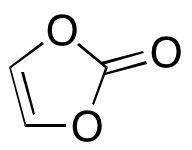HI! I’M ELEMENT AI.
Vinylene Carbonate

Product Description
Vinylene carbonate is a chemical compound with various industrial applications.
Product:
Vinylene Carbonate
CAS:
872-36-6
Synonym:
1,3-Dioxol-2-one; Carbonic acid, cyclic vinylene ester
Structure:

Typical Characteristics
Appearance
Colorless to pale yellow liquid
Boiling point
162 °C
Density
1.35 g/cm3
Flash Point
72 °C
Melting point
19-22 °C
Molecular Weight
86.05
Purity
99.5%
Refractive index
1.421
Uses, Applications & Markets
Key applications
get a quote
We Offer Vinylene Carbonate
in various grades
A few of the grades available are listed below:



Vinylene Carbonate used in many
industry applications
Vinylene carbonate is a chemical compound with various industrial applications. Here are some of its main uses:
- Lithium-ion Batteries: Vinylene carbonate is commonly used as an electrolyte additive in lithium-ion batteries to improve their cycling performance, safety, and lifespan. It forms a stable passivation layer on the surface of the lithium electrode, preventing the formation of dendrites and improving the battery's stability during charging and discharging cycles. This helps enhance the overall efficiency and reliability of lithium-ion batteries, making them suitable for portable electronic devices, electric vehicles, and grid energy storage systems.
- Electrochemical Capacitors: It serves as an electrolyte additive in electrochemical capacitors, also known as supercapacitors, to enhance their energy density, power density, and cycling stability. Vinylene carbonate improves the capacitance and charge-discharge characteristics of electrochemical capacitors by promoting the formation of a stable solid-electrolyte interface (SEI) layer on the electrode surface. This allows for rapid charge and discharge rates, high energy storage efficiency, and long-term cycling durability, making electrochemical capacitors suitable for applications in hybrid vehicles, renewable energy systems, and portable electronics.
- Electrolyte Solutions: Vinylene carbonate is used as a solvent and electrolyte additive in electrolyte solutions for various electrochemical processes, such as electrodeposition, electroplating, and metal surface treatments. It helps improve the solubility and conductivity of electrolytes, facilitating the transport of ions between electrodes and enhancing the efficiency of electrochemical reactions. Electrolyte solutions containing vinylene carbonate are utilized in industries such as metal finishing, semiconductor manufacturing, and electrochemical synthesis.
- Organic Synthesis: It serves as a versatile building block in organic synthesis for the preparation of functionalized organic compounds and polymers. Vinylene carbonate undergoes various chemical reactions, such as nucleophilic addition, Michael addition, and polymerization, to form a wide range of products with diverse chemical structures and properties. It is used in the synthesis of specialty chemicals, pharmaceutical intermediates, polymerizable monomers, and functional materials for applications in coatings, adhesives, and electronic devices.
- Surface Coatings: Vinylene carbonate is employed as a monomer or additive in the formulation of surface coatings and paints to enhance their adhesion, flexibility, and chemical resistance. It can copolymerize with other vinyl monomers to form crosslinked polymer networks with improved film-forming properties and mechanical strength. Coatings containing vinylene carbonate exhibit excellent adhesion to various substrates, including metals, plastics, and ceramics, making them suitable for use in automotive finishes, protective coatings, and corrosion-resistant coatings.
- Gas Separation Membranes: It is utilized in the fabrication of gas separation membranes for applications in gas purification, natural gas processing, and hydrogen recovery. Vinylene carbonate-based polymers can be synthesized into dense films or porous membranes with selective permeability to specific gas molecules, such as hydrogen, carbon dioxide, or methane. These membranes exhibit high gas permeance, selectivity, and chemical stability, enabling efficient separation and purification of gases in industrial processes and environmental applications.
- Biomedical Materials: Vinylene carbonate is used in the synthesis of biomedical materials, such as hydrogels, scaffolds, and drug delivery systems, for tissue engineering, regenerative medicine, and controlled drug release applications. It can be copolymerized with biocompatible monomers to produce hydrophilic polymers with tunable properties, such as swelling behavior, mechanical strength, and degradation kinetics. Biomedical materials containing vinylene carbonate offer favorable biocompatibility, bioactivity, and drug-loading capacity, making them suitable for therapeutic and diagnostic applications in healthcare and pharmaceutical industries.